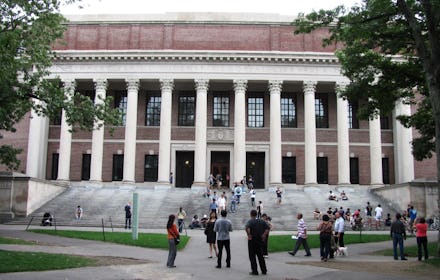42 Harvard Students Are Infected With Mumps — And That's Not the Scary Part

At bars near Harvard University, there's a saying: "I hope this drink doesn't give me mumps."
Harvard is in the midst of an outbreak. Since February 29, when two students first contracted mumps, there have been 40 new cases, according to Paul Barreira, Harvard's Director of Health Services. The viral disease has apparently spread to nearby Tufts University and Boston University.
"Honestly, what people have been saying is if you haven't gotten mumps yet, you're a prude," Sydney Jenkins, a 23-year-old senior at Harvard, told Mic. "It's not actually the case, it's a joke — but this hasn't stopped people from going out to drink."
Weeks after the initial outbreak, students are starting to treat the mumps scare as the status quo, but the university's director of health services can't overstate the need for diligence.
"I'm desperate," said Barreira, according to the Harvard Crimson. "I'm desperate to get students to take seriously that they shouldn't be infecting one another."
"Honestly, what people have been saying is if you haven't gotten mumps yet, you're a prude."
Mumps is highly contagious and travels through saliva. On the mild end of symptoms, it can cause fever, headache, muscle aches and loss of appetite. But in serious cases, it can result in meningitis, deafness and orchitis — or sterility.
Students with mumps on campus have been quarantined. According to junior Sophie Altchek, 23 (sister of Mic's Chris Altchek), the Inn at Harvard, a building usually used for student swing housing, is now acting as a quarantine zone for affected students. "I know three or four people who've had mumps now," Altchek said in a phone interview Thursday. "They used to just [quarantine] them at Health Services. They had to move them to that dorm."
But besides the campus-wide letters they've received urging them to wash their hands frequently, throw away snotty tissues and stop sharing drinking and eating utensils, students say the scare in the air has ebbed.
"When it first started, there were fewer than 10 cases and people were very afraid of it," said Consuelo Hylton, a 20-year-old student who knows someone currently quarantined, in a phone interview. (Hylton's sister Antonia also works at Mic.) "Right after spring break, most students had given up and stopped thinking about it. At this point, it's kind of a joke. Most people say we're all gonna get mumps and then go off on summer break and spread it. But it's not really funny."
The dumbfounding thing here is that mumps is an old disease. It's broken out at Harvard before — in 1937. Most children are vaccinated against it. But according to Anita Barry, director of the Infectious Disease Bureau of the Boston Public Health Commission, the mumps vaccine only works 88% of the time. That's a B+ at best, depending on the curve.
What's most alarming now isn't how those first two students, an undergraduate and a graduate student at Harvard Divinity School, originally got mumps. In the face of a rare outbreak months before students go back to their home states, countries and continents, the number of cases is only rising.